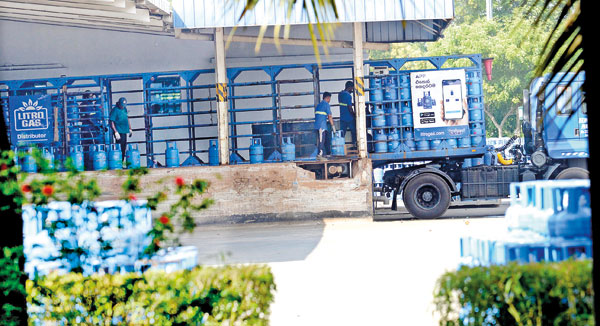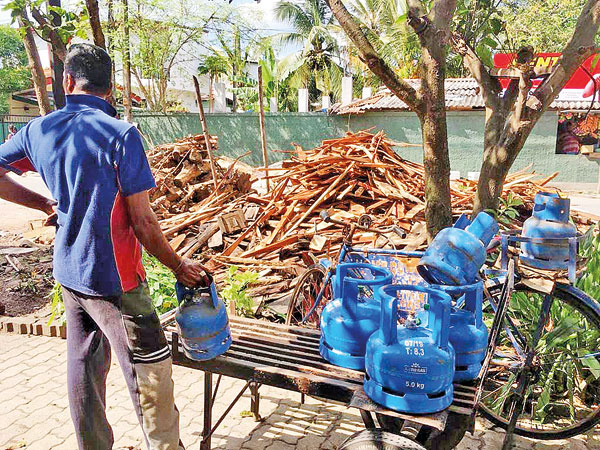News
Smell of death, stench of gas duopoly and regulatory rot linger

Ready for distribution: A lorry being loaded with domestic gas cylinders at Kerawalapitiya on Saturday evening. Pic by Eshan Fernando
Bureacatic bungling, indecisions and confusion continued last week on the country’s domestic cooking gas supply with the government rejecting two LPG (liquid petroleum gas) shipments at the Colombo Port only to reverse its decision within days.
The Consumer Affairs Authority (CAA) on December 11 suspended the unloading of tanker Epic Balta from Bangladesh carrying 3,200 metric tonnes of LPG after testing samples. The CAA said the Ethyl Mercaptan in the shipment was inadequate.
The odor of this gas helps to detect leaks.
However on Friday, it reversed the decision and granted permission to unload the shipment while a second shipment was waiting to unload.
Litro Gas Chairman Thesara Jayasinghe said the second tanker from Maldives carrying 2,000 MT of LPG has to be checked whether they conform to SLSI standards before unloading.
Litro Gas said the first shipment would be unloaded and supplied to the market by last evening, assuring that there will be no shortages.
Meanwhile, cooking gas-related explosions continued last week.
The first death was reported in the National Hospital, Kandy on Monday.
A 52 year old woman from Kundasale died from severe burns suffered in a cooking gas-related explosion at home. She had been treated for a week in the hospital.
The same week, the Court of Appeal ordered Litro Gas and Laugfs Gas Plc to distribute gas canisters approved by the Sri Lanka Standards Institution. The companies were also directed to display a sticker on the cylinder mentioning the composition of gas.
In addition, the companies were ordered to withdraw “all full, sealed and unused gas cylinders meant for domestic use that are either available in the market or with the consumers, (if such consumers so wished to return), and replace those recalled gas cylinders with new full gas cylinders on a free of charge basis’’.
On Friday, the Sri Lanka Human Rights Commission ( SLHRC) resummoned the CEOs of Litro and Laugfs Gas on complaints made by the Young Journalist Association on the unsafe gas distributed in the market.

Moratuwa: Empty gas cylinders but enough firewood for sale. Pic by Rekha Tharanganie
Earlier last week, the companies had failed to appear before SLHRC when summoned for an inquiry.
The Director General of Industrial Technology Institute (ITI) and chairman of the Ceylon Petroleum Corporation were also present.
The SLHRC will prepare a report for President Gotabaya Rajapaksa this week.
Also, the report from the eight member Presidential Committee headed by Prof Shantha Walpola of the Moratuwa University to examine gas explosions, is due this week.
Meanwhile, Litro launched a new insurance scheme for victims of gas explosions on Monday.
Compensation of up to Rs 1 million may be claimed for a death, bodily injuries and damage to property caused by a gas explosion involving leaking gas cylinders, accessories, or manufacturing defects.
The director or procurement, Terence Appuhamy, said that there is insurance cover provided by Litro regulator manufacturers, granting up to US$1 million.
Meanwhile, the CAA’s former executive director Thushan Gunewardena said the Court of Appeal decision was not adequate to address several issues related to LPG supply.
Among them are compliance matters on the use of uncertified cylinders as old as 40 years.
“They have cylinder markings as far back as 1982,’’ he said.
The gas cylinders have to be cleaned and certified every five years in keeping with SLS requirements.
Procurement procedures should be monitored to ensure the ideal composition of gas.
“Regulatory bodies including the CAA, the Public Utilities Commission and the SLSI should have a member at their board meetings,’’ he said.
Also there is a grey area following a Court of Appeal directive to adhere to SLSI regulations when supplying gas. The SLSI regulates only the cylinder and not what is in it.
“There are no regulations on the composition of the gas,’’ he said.
Consumer Protection State Minister Lasantha Alagiyawanna said the issues will be addressed soon and steps will be taken to supply safe gas to households.
The best way to say that you found the home of your dreams is by finding it on Hitad.lk. We have listings for apartments for sale or rent in Sri Lanka, no matter what locale you're looking for! Whether you live in Colombo, Galle, Kandy, Matara, Jaffna and more - we've got them all!

